''This is the first time a van of this type has been used to display multiple images of people wanted by the police,'' said Acting Detective Inspector Mark Rushton as he launched the scheme on Thursday.
''We've already had a fantastic response to the public who have been calling the special information line or emailing us. We've taken over 500 calls which are helping us make arrests.
''Photographs of those wanted by us have appeared in the media but we are determined to use every means available to us to bring suspected offenders to justice.''
Police across England have published CCTV pictures of those suspected of looting shops and restaurants in London and other major cities during four days of unprecedented rioting earlier this week.
More than 1500 people have been arrested so far and more than 500 charged. The courts have been sitting all night to process the cases, and several people have already been convicted and sent to jail.
Meanwhile, a 22-year-old man was arrested yesterday over the murder of Richard Mannington Bowes, a 68-year-old man who was brutally attacked during rioting in Ealing, west London.
Bowes, who was branded ''a hero'' by the mayor of London Boris Johnson after confronting rioters during the violent unrest on Monday, died just before midnight Thursday.
The man, described as a loner, sustained serious head injuries as he tried to stamp out a fire started by rioters.
He was placed on a life support machine but never regained consciousness.
Police only discovered his identity on Thursday morning after making contact with his sister, The Times reported.
Anne Wilderspin, who lives in Derbyshire, central England, is thought not to have spoken to her brother in many years.
Before his death, she told ITN News: "I'm very sad that we have to see him like this, but in one way I'm very pleased that we could actually make contact again."
Bowes lived alone, seemed to have no contact with friends or family and was barely known to his neighbours. Despite this, people in Ealing said one thing marked him out - his constant willingness to stand up for that community against anti-social behavior.
The retiree lived in a flat above shops in central Ealing, and neighbors said he regularly remonstrated with youths who would urinate in the street after a night out drinking.
A neighboring cafe owner, who was badly beaten in Monday's riot and asked not to be named for fear of further attacks, told The Times: "I always saw him alone. He was very quiet and didn't talk to anybody, but he was OK ... It's such a shame, what happened to him. He was so harmless."
On a visit to the riot-hit streets of Ealing, Mr Johnson said of Bowes: "I feel desperately sorry and sad for him and what a hero he is. As I understand he stood up in front of looters and tried to stop what was happening. He is an example to everyone. My thoughts and prayers are with him."
Detective Chief Inspector John McFarlane, who is leading the inquiry, said local officers had witnessed the attack but were powerless to help as rioters bombarded them with bricks.
"This was a brutal incident that resulted in the senseless killing of an innocent man," he said.
"I still need the assistance of the community who may have witnessed the attack on Richard, to come forward and provide information or images they may have recorded on mobile devices. This information could be crucial in catching his killer."
Video footage of a man suspected of carrying out the assault has been publicly released, with police describing him as a black man "of a big build."
"We know he was in the company of a large group of others, and that he appeared to be known to a considerable number of youths and young men who were also in the area," a police statement said.
Bowes' death follows the killing of three men in Birmingham, who were run down as they took to the streets to defend shops from looting.
Haroon Jahan, left, Shazad Ali and Abdul Musavir were killed during the riots in Birmingham.
Haroon Jahan, Shazad Ali and Abdul Musavir died in the chaos
Police on Thursday arrested three more men on suspicion of murder - a 16-year-old, a 17-year-old and a 26-year old.A 32-year-old man arrested a day earlier was released on bail.
Watch now: Grieving dad appeals for calm
Birmingham residents the scene where three men were killed in a hit-run during riots.
Birmingham residents at the scene of the deaths
Meanwhile, British Prime Minister David Cameron has revealed his government is considering having the option to disable social media in certain areas in the wake of recent unrest.Speaking in parliament, Mr Cameron said Britain would look to the United States for solutions to gang violence after nights of riots and looting, and promised authorities would get strong powers to stop street mayhem erupting again.
Mr Cameron told MPs he was "are acting decisively to restore order on our streets", as police raided houses to round up suspects from four nights of unrest in London and other English cities.
He said the government, police and intelligence services were looking at whether there should be limits on the use of social media sites like Twitter and Facebook or services like BlackBerry Messenger to spread disorder.
BlackBerry's simple and largely cost-free messaging service was used by rioters to coordinate their activities, Mr Cameron's office said.
Britain's Home Office said it planned to hold talks with police chiefs, Twitter, Facebook and Blackberry manufacturer Research In Motion Ltd.
Facebook looks forward to meeting with the home secretary, the company said in a statement, adding that it has taken steps in recent days to ensure that any credible threats of violence are removed from the social networking site.
Government officials said they were discussing with spy agencies and communications companies whether messaging services could be disabled in specific areas, or at specific times.
Authorities are considering "whether it would be right to stop people communicating via these websites and services when we know they are plotting violence, disorder and criminality,'' Mr Cameron said.
MPs were summoned back from their summer holidays for an emergency session of parliament as the government and police worked to regain control, both on the streets and in the court of public opinion.
Calm prevailed in London overnight, with a highly visible police presence watching over the capital, but a sense of nervousness lingered across the country.
During a session lasting almost three hours in which he faced 160 questions from lawmakers, Mr Cameron promised tough measures to stop further violence and said "nothing should be off the table".
He said that included water cannon and plastic bullets - though senior police have said they don't feel the need to use those at the moment.
He also said officials would look at "whether there are tasks that the army could undertake that would free up more police for the front line".
Steve Kavanagh, the deputy assistant commissioner of London's Metropolitan Police, admitted the force initially did not deploy enough officers to control the outbreak of violence, saying "it is clear we did not have enough numbers on duty to deal".
Police arrested a suspect after raids in south London
Mr Cameron also acknowledged that police had been overwhelmed by mobile groups of looters in the first nights of the rioting and said authorities were considering new powers, including allowing police to order thugs to remove masks or hoods and evicting troublemakers from subsidised housing.He said the 16,000 police deployed on London's streets to deter rioters and reassure residents would remain through the weekend.
"We will not let a violent few beat us,'' Cameron said.
Mr Cameron said he would seek American advice on fighting the street gangs he blamed for helping spark Britain's riots.
He told lawmakers that he would look to cities like Boston for inspiration, and mentioned former Los Angeles, New York and Boston Police Chief William Bratton as a person who could help offer advice.
Police swooped on houses across London yesterday, detaining suspects and retrieving stolen goods.
The number of people arrested since Saturday rose to 1009, with 464 suspects charged.
Normality is being restored in London, although soccer authorities announced that Tottenham Hotspur's season-opening match against Everton on Saturday was being postponed.
Nine other Premier League matches due to be played this weekend across the country will go ahead as scheduled.
As authorities attempted to dispense swift justice to rioters, there were chaotic scenes at courthouses, several of which sat through the night to process scores of alleged looters and vandals, including an 11-year-old boy.
The defendants, mostly young but otherwise diverse, included a teenage ballerina, a university English student from a prosperous commuter town and Natasha Reid, a 24-year-old university graduate who admitted stealing a TV from a looted electronics store in north London.
Her lawyer said she had turned herself in because she could not sleep because of guilt.
Also due to appear in court were several people charged with using Twitter and Facebook to incite violence.
London Riots Lead to Calls for More Police on the Streets
have raised concern from British citizens about the ability of the police to restore order to the increasingly chaotic situation. Police officers do not carry firearms in Britain, but frequently use water cannons and tear gas a means to control riots. When necessary, however, batons and riot shields are used at a minimum, to restore order.
There are opposing views on the how the riot can be controlled, with calls from London citizens, bloggers, columnists, and even members of Parliament urging the Metropolitan Police (MP) to use more aggressive strategies to control the rioting crowds. They argue that an army should be used, and a curfew should be enforced to help control looters and arsonists, and restore order to London.
Citizens report feeling abandoned by the MP who are charged with protecting the people of London. However, the responsibility for crowd control rests not only with the MP, but also with Parliament who has to consent to the police’s use of additional tactics to control the rioters. Some argue that the use of Compagnies Républicaines de Sécurité, or (CRS) a specialized riot force unit that controls massive crowds would work well help contain the London riots; however, in Britain, no such force unit exists.
Critics argue that the present failure of the police to use additional force to control the London riots may be attributed to claims stemming from the Brixton riots which took place 20 year ago. During the Brixton riots, a judicial investigation found that the police were “disproportionate and indiscriminate” in their use of force to control the riots. Yet, with the daily increase in arson and thief across London, there is outcry from citizens for immediate and forceful police action to help restore order to the city.
As of Tuesday, more than 16,000 officers were dispersed throughout London to help control the riots; nevertheless, requests for additional police force to put an end the riots continue.
Image London Riots
london riots



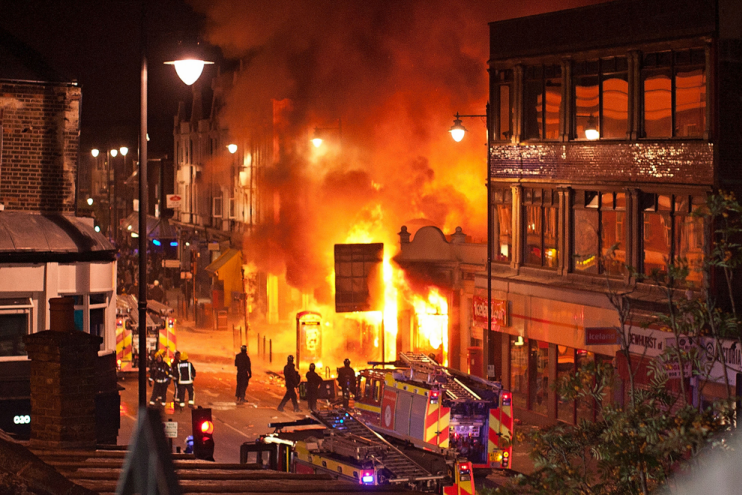



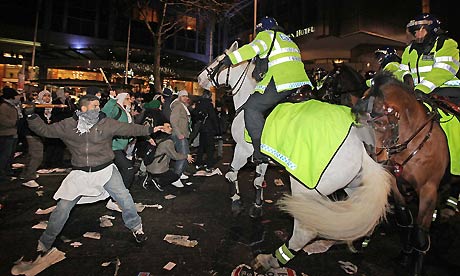
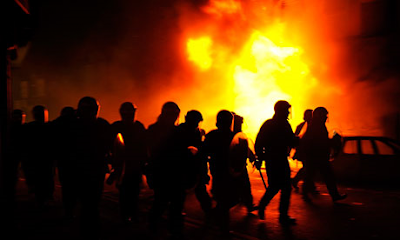
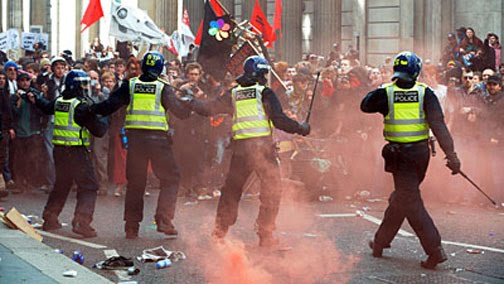
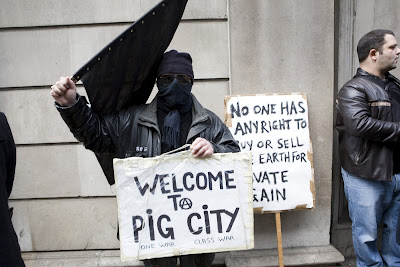


No comments:
Post a Comment